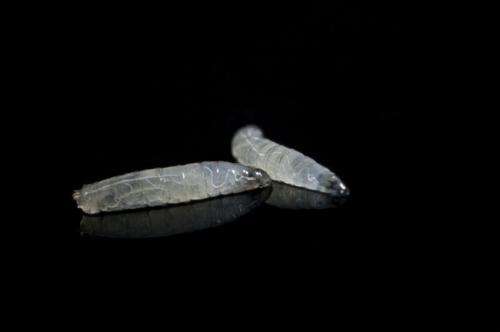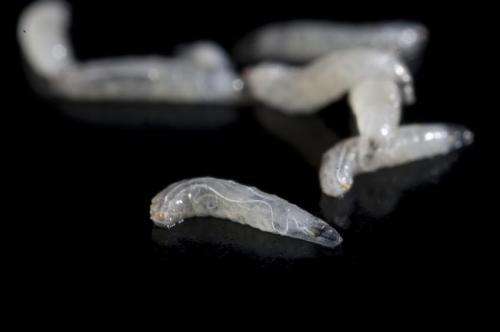Alcoholic fly larvae need fix for learning

Fly larvae fed on alcohol-spiked food for a period of days grow dependent on those spirits for learning. The findings, reported in Current Biology on November 29, show how overuse of alcohol can produce lasting changes in the brain, even after alcohol abuse stops.
The report also provides evidence that the very human experience of alcoholism can be explored in part with studies conducted in fruit flies and other animals, the researchers say.
"Our evidence supports the long-ago proposed idea that functional ethanol tolerance is produced by adaptations that counter the effects of ethanol, and that these adaptations help the nervous system function more normally when ethanol is present," says Brooks Robinson of The University of Texas at Austin. "However, when ethanol is withheld, the adaptations persist to give the nervous system abnormal properties that manifest themselves as symptoms of withdrawal."

Robinson and his colleagues found that alcohol consumption, at a level equivalent to mild intoxication in humans, at first impeded learning by fly larvae. More specifically, those larvae had some trouble in associating an unpleasant heat pulse with an otherwise attractive odor in comparison to larvae that had not been drinking alcohol.
After a six-day drinking binge, however, those larvae adapted and could learn as well as normal larvae could. In fact, the alcohol-adapted animals learned poorly when their ethanol was taken away from them. And, when given alcohol back, their learning deficit was erased.
Robinson says that the findings are the first proof of cognitive ethanol dependence in an invertebrate, suggesting that some of ethanol's ability to change behavior must begin at the cellular level. After all, flies and humans share many of the same features at the level of individual neurons, and not so much in terms of the way those neurons are put together into working circuits.
The study also shows that the "responses to ethanol that addict and plague us" have a very long evolutionary history, Robinson says. And that means that genetic analysis in flies might yield some very important answers.
More information: Robinson et al.: "Neural Adaptation Leads to Cognitive Ethanol Dependence." DOI: 10.1016/j.cub.2012.10.038
Journal information: Current Biology
Provided by Cell Press














